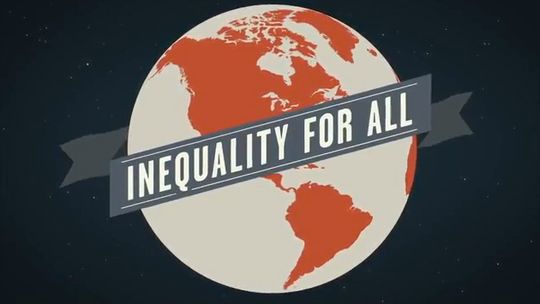At Work: Don't let cynicism about economy drag you down
Who's looking out for the American worker?
Nobody, Robert Reich says.
Actually, he is.
REVIEW: 'Inequality' rich portrait of middle class
2010: Time to stoke the economy, Reich says[1][2]
He has been standing up for the little guy his entire career, first writing policy in the public sector as secretary of labor under President Bill Clinton and serving in the administrations of Presidents Gerald Ford and Jimmy Carter.
He is a best-selling author of 13 books and holds the title chancellor's professor of public policy at the University of California, Berkeley where he teaches the class "Wealth and Poverty." Now Reich is the star of Inequality for All, an engaging documentary that opens in theaters this week.
It's his latest shot at helping people connect the dots about how we got where we are and why economic inequality to the degree we have now is bad for everyone — including the wealthy.
He is entertaining as only the spirited Robert Reich can be as he drives around in his Mini Cooper and references his 4-foot, 10½-inch stature in his self-deprecating yet dignified way.
He also is illuminating. He skillfully walks you through the forces that affect middle-class workers who are the heart of our economy but no longer have the purchasing power to expand it.
“Some inequality is inevitable, (but) people would be less concerned about inequality of income and wealth if everybody had a chance to make it.”
— Robert Reich, star of 'Inequality for All'In my conversation with Reich, he empathetically describes such workers as anxious, frustrated and often angry.
Reich, too, is deeply frustrated that we haven't made more progress. This champion of opportunity for all describes the middle class as "working harder than ever — if they have a job — and less economically secure in living memory. Most are getting nowhere."
At the same time, wealth has become more concentrated.
"Today, the richest 400 Americans have more wealth than the bottom 150 million of us put together," he says.
He never vilifies the rich. He offers a rigorous argument that the wide income division threatens the health of our economy and our democracy and makes the case for having an economy that works for everyone.
"In the last three to five years, we're the only advanced nation where upward mobility has dramatically decreased," he says. "Some inequality is inevitable, (but) people would be less concerned about inequality of income and wealth if everybody had a chance to make it."
Today, the American dream of upward mobility by working hard and having enough guts and gumption is fading, Reich says.

Former Secretary of Labor Robert Reich in a scene from a 2006 documentary called "The One Percent."(Photo: Wise & Good Film)
So what can restless, uncertain workers and others who want economic change do?
"We can't be cynical," he says. "The danger is a self-fulfilling prophecy."
Reich acknowledges he has no magic bullet. But "if you think there's no way to change the rules, look at American history. Every time we were in danger of losing our American dream, we reformed the system."
The first step is understanding the magnitude and danger of the problem, he says. Then use your power to reverse the trend. Inequalityforall.com[3] offers ideas in six areas for making your voice heard. They include these:
• Strengthen workers' voices by launching your own campaign for large and small change in the workplace from improving office break rooms to providing sick leave to employees. Coworker.org[4] gives details.
• Invest in education to "ensure everyone has access to a great education spanning from early childhood to post secondary." Start by supporting the Preschool for All Initiative. Learn ways to make college more affordable starting with the Generation Progress petition.
Reich is hopeful that "the system can be reformed in ways so people don't have to rely on luck … or knowing the right people or picking the right shares of stock" to be upwardly mobile.
As rigged as the system feels, your only option is to fix it "to make sure the game works as it should with opportunity for all who work hard, study hard and do everything you should."
After all, that is the American way.
Career consultant Andrea Kay[5] is the author of This Is How To Get Your Next Job: An Inside Look at What Employers Really Want. Reach her at This email address is being protected from spambots. You need JavaScript enabled to view it.[6]. Twitter: @AndreaKayCareer[7].

References
- ^ http://www.usatoday.com/story/life/movies/2013/09/26/inequality-for-all-movie-review/2863893/ (www.usatoday.com)
- ^ http://usatoday30.usatoday.com/news/opinion/editorials/2010-09-03-editorial03_ST1_N.htm (usatoday30.usatoday.com)
- ^ Inequalityforall.com (inequalityforall.com)
- ^ Coworker.org (coworker.org)
- ^ http://andreakay.com/ (andreakay.com)
- ^ This email address is being protected from spambots. You need JavaScript enabled to view it. (rssfeeds.usatoday.com)
- ^ http://twitter.com/AndreaKayCareer (twitter.com)










